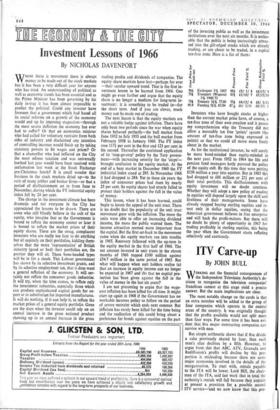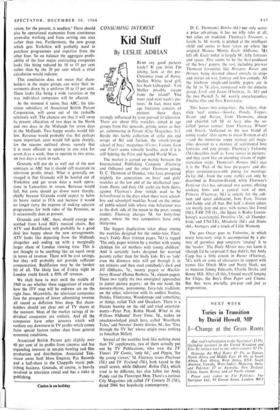ITV Carve-up
By JOHN BULL
WORKING out the financial consequences of the Independent Television Authority's de- cision to reorganise the television companies' franchises cannot at this stage yield a precise answer. But the main implications are clear.
The most notable change on the cards is that an extra member will be added to the group of four companies which operate in the central areas of the country. It was originally thought that the profits available would not split more than four ways. For some time it has been evi- dent that five major contracting companies can survive with ease.
But simple arithmetic shows that if five divide a cake previously shared by four, then each man's slice declines by a fifth. However, to argue from this that ABC, ATV, Granada and Rediffusion's profits will decline by this pro- portion is misleading because there are some major economies involved in the details of the reorganisation. To start with, rentals payable to the ITA will be lower. Lord Hill, the chair- man of the ITA, said last week that in total the authority's rentals will fall because they contain at present a provision for a. possible second ITV service—`and we now know that this pro-
vision, for the present, is needless.' There should also be operational economies from continuous seven-day working and from serving one area rather than two. Furthermore, the new group which gets Yorkshire will probably need to purchase programmes and expertise from the other four. So on balance the aggregate profit- ability of the four major contracting companies looks like being reduced by 10 to 15 per cent rather than by the 20 per cent which a strict calculation would indicate.
This conclusion does not mean that share- holders in the major groups can write their in- vestments down by a uniform 10 to 15 per cent. There looks like being a wide variation in the way individual companies will be affected.
At the moment it seems that ABC, the tele- vision subsidiary of Associated British Picture Corporation, will come out of the reshuffle relatively well. The chances are that it will swop its present allocation of two days in the North and two days in the Midlands for seven days in the Midlands. Two happy results would fol- low. Revenue would probably rise. But perhaps more important, costs would fall quite sharply, for the reasons outlined above, namely that it is more efficient to operate in one area for seven days a week, than to operate in two areas, on two days a week in each.
Granada will not do as well out of the new contracts as ABC but it should still maintain its television profits intact. What is generally en- visaged is that Granada will be hoofed out of Yorkshire and get seven days a week opera- tions in Lancashire in return. Revenue would fall, but costs should go down more sharply, chiefly because Granada could expect to halve its heavy rental to ITA and because it would no longer carry the expense of making separate programmes for both sides of the Pennines, as it occasionally does at present.
Granada and ABC, then, should emerge un- scathed from Lord Hill's musical chairs. But ATV and Rediffusion will probably be a good deal less happy about the new arrangements. ATV looks like departing from the Midlands altogether and ending up with a marginally larger share of London viewing time. This is not thought to be anything like an equal swop in terms of revenue. There will be cost savings, but they will probably not provide sufficient compensation. Rediffusion may be the hardest hit of all. The likely loss of Friday night in London could knock a fifth off revenue.
We shall have to wait until the middle of 1968 to see whether these suggestions of exactly how the [TV map will be redrawn are on the right lines. Meanwhile, the television companies face the prospects of lower advertising revenue all round as deflation bites deep. But share- holders should not clear out of TV shares at the moment. Most of the market ratings of in- dividual companies are realistic. And all the companies have other interests which will cushion any downturn in TV profits which comes from special factors rather than from general economic conditions.
Associated British Picture gets slightly over 40 per cent of its profits from cinemas and has expanding interests in ten-pin bowling and film production and distribution. Associated Tele- vision owns Stoll Moss Empires, Pye Records and a half-share in the Chappells music pub- lishing business. Granada, of course, is heavily involved in television rental and has a stake in publishing.
Custos is on holiday







































 Previous page
Previous page